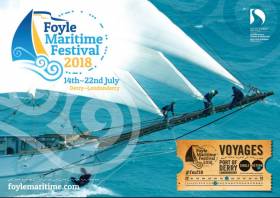Displaying items by tag: Maritime Tours
Maritime History is in Derry City’s DNA
#MaritimeHeritage - A rich seafaring past in Derry-Londonderry tells the story of the city itself. From pre-history settlements to nineteenth century emigration, from the Siege to the Second World War, the water has played a vital round in shaping the individuals and events that have made it what it is today.
During this year’s Foyle Maritime Festival, which starts on Saturday (July 14), the Foyle Voyages marquee will take visitors on 9,000 years of heritage, from the Neolithic to the present day.
Ronan McConnell, Education Officer, from Derry City and Strabane District Council’s Heritage and Museum service, said: “Situated on the banks of the Foyle during the festival, visitors will experience how the lough shaped the city and the surrounding region, and how some of the most pivotal events in European history were decided on its waters.
“The artefacts and themes of the exhibition represent a flavour of the interpretative content for the planned DNA project at Ebrington Square. There will also be central pod introducing the DNA concept to the public through a short film as well as providing an opportunity to give feedback.
“DNA represents the region’s importance as a gateway to the North Atlantic and its historic connection with ebb and flow of people who came and left here over the centuries. The project is informed by ‘Hundreds of years, Millions of Stories.’”
‘Foyle Voyages’ will be open from 12 noon to 8 pm each day of the event from Saturday 14th July until Sunday 22nd July featuring original artefacts from prehistory to the present day.
And if that whets the appetite, why not take up a tour of the City Cemetery to find out a bit more about the great and the good of the Derry of old who owned and operated the vessels involved in so many of those momentous periods in our maritime past?
From the dockers and seamen, naval captains and captains of industry whose lives were inextricably linked to the water they worked, local historian Seamus Breslin can bring them all to life with his specialised maritime tours which will leave from the city centre every afternoon of the Foyle Maritime Festival (July 14 – 22).
The maritime cemetery tour will depart from Waterloo Place each day of the festival (July 14 – 22) at 2 pm, tickets are £5 per person. To book, contact the Tourist Information Centre on 028 7126 7284 or contact Seamus on 079 3577 9498.
For a full festival programme, visit: www.foylemaritime.com





























































